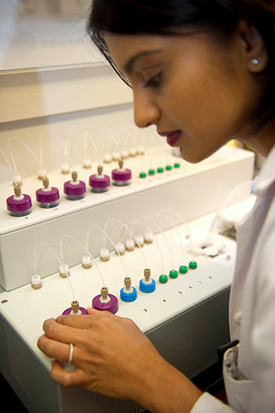Dr. Beltran at Forefront of New Pathway for the Treatment of Prostate Cancer
November 17, 2011

Dr. Beltran at work in the lab
Advanced prostate cancer takes the lives of 30,000 men per year. Dr. Himisha Beltran, Assistant Professor of Medicine and former fellow (Division of Hematology and Medical Oncology), and Dr. Mark A. Rubin, Professor of Pathology and Laboratory Medicine, have published a paper in Cancer Discovery describing a potential new pathway for the treatment of prostate cancer.
Dr. Beltran joined the Department of Medicine as a Hematology/Medical Oncology Fellow in 2008 and was appointed to Assistant Professor of Medicine in early 2011. Since 2009, she has been the lead investigator of an internationally recognized study, the largest in-depth analysis of neuroendocrine prostate cancer to date. Neuroendocrine prostate cancer is lethal, with most patients surviving less than one year from diagnosis. Although it comprises only 2% of initial prostate cancer diagnoses, patients can progress from a more common prostate adenocarcinoma to a neuroendocrine form as their cancer becomes more advanced.
Exemplifying bench-to-beside research and "team science" at its best, the study team includes: Dr. Rubin (senior investigator), Dr. David Nanus (co-Chief, Division of Hematology and Medical Oncology), and Dr. Scott Tagawa (Division of Hematology and Medical Oncology), as well as many collaborating researchers from across the United States, Canada, and France. The paper published in Cancer Discovery identifies a new molecular target for this lethal subtype of prostate cancer for which there is currently a drug available. Specifically, Drs. Beltran and Rubin have discovered that the aurora kinase inhibitor PHA-739358 works against human neuroendocrine prostate cells. To date, the more common adenocarcinoma prostate cancer is treated via androgen suppression therapy. This treatment is utilized well for the more common prostate cancer. But, it is speculated that as the androgen suppression therapy destroys the common cancer cells, neuroendocrine prostate cancer cells grow in their place. If ongoing research confirms this hypothesis, this new molecular pathway could offer hope for the treatment of neuroendocrine prostate cancer.